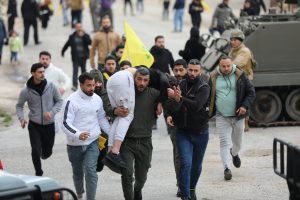Sunday was meant to be the end of the 60-day ceasefire between Israel and Lebanon. Numerous displaced civilians from southern Lebanon appeared to believe this also meant an end to Israeli orders not to attempt to return home. Unfortunately, as Israel decided to stay, its demand that people not return to their own homes in Lebanon also remains in place.
This was tested Sunday, when hundreds of Lebanese civilians headed south toward their hometowns and villages. This resulted disastrously, with Israeli troops firing on them en masse, with the current toll now standing at 22 killed, and 124 wounded.
The slain include multiple women and at least one Lebanese soldier. It is believed this is only the start, as many displaced people are waiting for Monday to try to return home as the ceasefire technically ends overnight between Sunday night and Monday morning.

A man carries an injured person in Burj al-Muluk, near the southern Lebanese village of Kfar Kila, where Israeli forces remained on the ground after a deadline for their withdrawal passed as residents sought to return to homes in the border area, Lebanon January 26, 2025. REUTERS/Karamallah Daher
Israel appeared to anticipate this when it announced over the weekend it would ignore the requirement to withdraw from Lebanon by the end of the ceasefire. There were reports of IDF setting up roadblocks across the occupied south, and Israeli troops were in position to start shooting when civilians started showing up.
IDF Arabic-language spokesman Avichay Adraee made a new series of Twitter posts demanding civilians do not attempt to return home. After the shooting started being reported, he made further posts saying the attempted civilian return proved Hezbollah was “without honor.” He also presented the occupation as “defensive” against Iran and insisted Israeli troops undertake all their actions with a “clear conscience.”
Some of the returning civilians were holding up Hezbollah flags. This led to the IDF narrative that the people trying to get home were “suspects” and that Hezbollah were among them. Israel couched this wholesale killing and wounding of dozens of civilians as a “Hezbollah provocation.” Israel also said that its operations were meant “to prevent the return of enemy and civilians beyond the agreed line.”
It’s never been publicly confirmed by anyone that the ceasefire was intended to prevent civilians from moving around anywhere inside Lebanon, although Israel has repeatedly warned them against trying to do so.
The IDF also suggested that a deal to “extend” the ceasefire is still being discussed with the US. There is no indication Lebanon is being included in these discussions, and furthermore, there is no indication that the US will not endorse the now open-ended Israeli occupation of the area.
Last week it was reported Israel was seeking to extend the ceasefire by 30 days, but that President Trump was “reluctant” to grant Israel that request. The US had “guaranteed” to Lebanon that Israel would be out of the country by the 60-day deadline.
Today though, the White House announced that they had extended the ceasefire another 22 days, until February 18. They also claimed President Trump’s “forceful hand” should be credited for the first ceasefire. Lebanon’s government says they will accept the extension, meaning they’ll accept the continued Israeli occupation. There is as-yet no word if Hezbollah was consulted on the matter or if they intend to respect this new deadline.
During the 60-day ceasefire, Israel only fully withdrew from a couple of villages in southern Lebanon, and those villages were effectively destroyed before they left. Since then, IDF troops have occupied new towns, and are systematically destroying homes and infrastructure in areas across the south.
There is no real suggestion that the extension of the ceasefire would actually mean Israeli troops would leave another 22 days hence. Rather, it seems more of an attempt to tamp down international discussion of Israel’s flagrant violations for a few more weeks, while allowing the destruction to continue.


